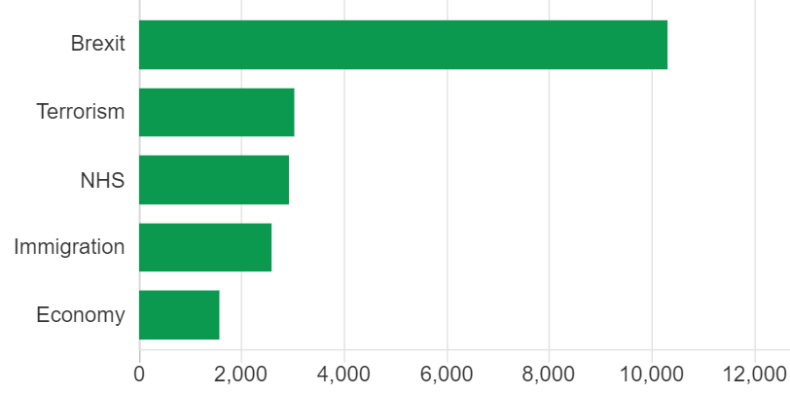Brexit was the top issue for voters at the 2017 general election
The latest data from the British Election Study – the ‘gold-standard’ set of research for each general election – shows that Brexit was top of voters’ concerns ahead of the election:
More than one in three people chose Brexit or the EU, compared with fewer than one in 10 who mentioned the NHS and one in 20 who suggested the economy.

If you didn’t already know the 2017 general election result, that might have sounded like good news for the Liberal Democrats. But:
Despite having the clearest pro-EU position and a promise of a second referendum, the Liberal Democrats failed to pick up many more Remain voters than they lost. Instead, Labour, which was already the most popular party in 2015 among those who voted Remain in 2016, scooped the lion’s share.
So what went wrong with the Lib Dem European message?
As this data shows, the answer isn’t that voters weren’t thinking about Europe. Nor was it that people didn’t like the idea of a referendum on the terms of Brexit – there were more than enough who did to have fuelled a good Lib Dem result and their numbers have been growing.
Rather the problem was:
- Talking about a referendum on the terms of Brexit is talking about process, not outcomes. It’s a means to an end, but means to ends only rarely clearly communicate what you’re about or inspire voters.
- The Lib Dems didn’t have political momentum. The combination of the unexpected loss of seats in the May local elections, the cancellation of the Manchester Gorton by-election (where the early canvassing was very promising) and then the questions about Tim Farron’s faith all meant the party didn’t look like it was soaring forward. That then reinforced a pessimism amongst many Remainers when, if the party had been moving on up, they would instead have reacted by thinking, ‘you know what? perhaps we can win this thing after all – so I’m going to vote Lib Dem’.
- As a result if you are a pro-European and thought therefore that the realistic choice was between Conservative, Labour or not voting then voting for Labour – for all the fact that Labour is led by someone who went on holiday rather than campaign for the pro-European case at a crucial moment of the referendum – had a certain logic to it. Labour is not a Remain party, but the sort of values it tried to appeal to – such as a more inclusive society – are also values which help explain why Remainers back Remain. Which made Labour a better choice than the Conservatives, not voting or the stalling Liberal Democrats.
- All of which played into other weaknesses for the Lib Dems – too few people thinking they knew what the party stood for, having a party leader who ended the campaign polling less well than the party and the failure so far to either make a virtue out of defending the party’s record in coalition or alternatively to move beyond it.
There was, of course, more to the Lib Dem result than just this issue. For a broader analysis of the Lib Dem result, see Lib Dem Newswire #100.
The data doesn’t specify if ‘the people’ concerned about Brexit were For or Against it… weren’t the majority For Brexit? – therefore probably not going to vote for Lib Dems.
Confirmation bias Mark.
Think Newsnight had a better insight into the stats and from my experience on the doorstep. People are concerned about Brexit but they have accepted the result. They just want it to be as painless as possible. The LibDems haven’t got the message. The last thing people want at the moment is another referendum. Now that may change, but in 2017 that is where they are. Labour was nearer the mark with their fudge. Maybe a better message would have been to seek an associate membership with the option to rejoin a reformed EU at some point. That may have given us the wriggle room. LibDems need a re-think and quickly.
@Paul: the evidence is that quite a lot of people do want a referendum on the terms of Brexit – e.g. see https://www.markpack.org.uk/150758/brexit-second-referendum-polling/ which both shows significant and growing support rather than acceptance of the result.